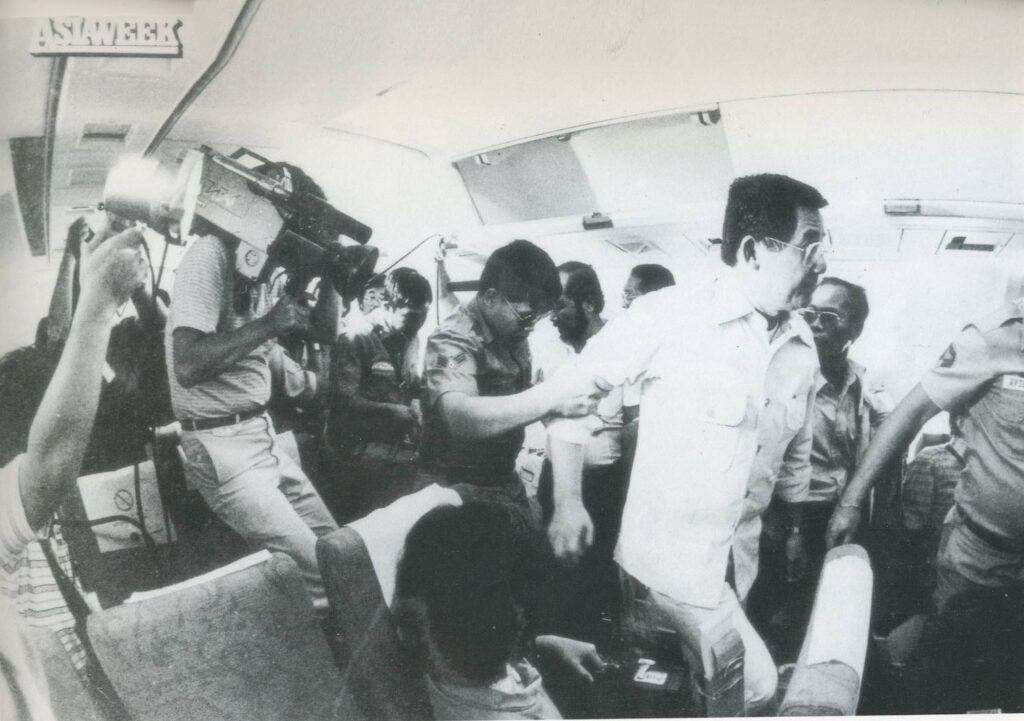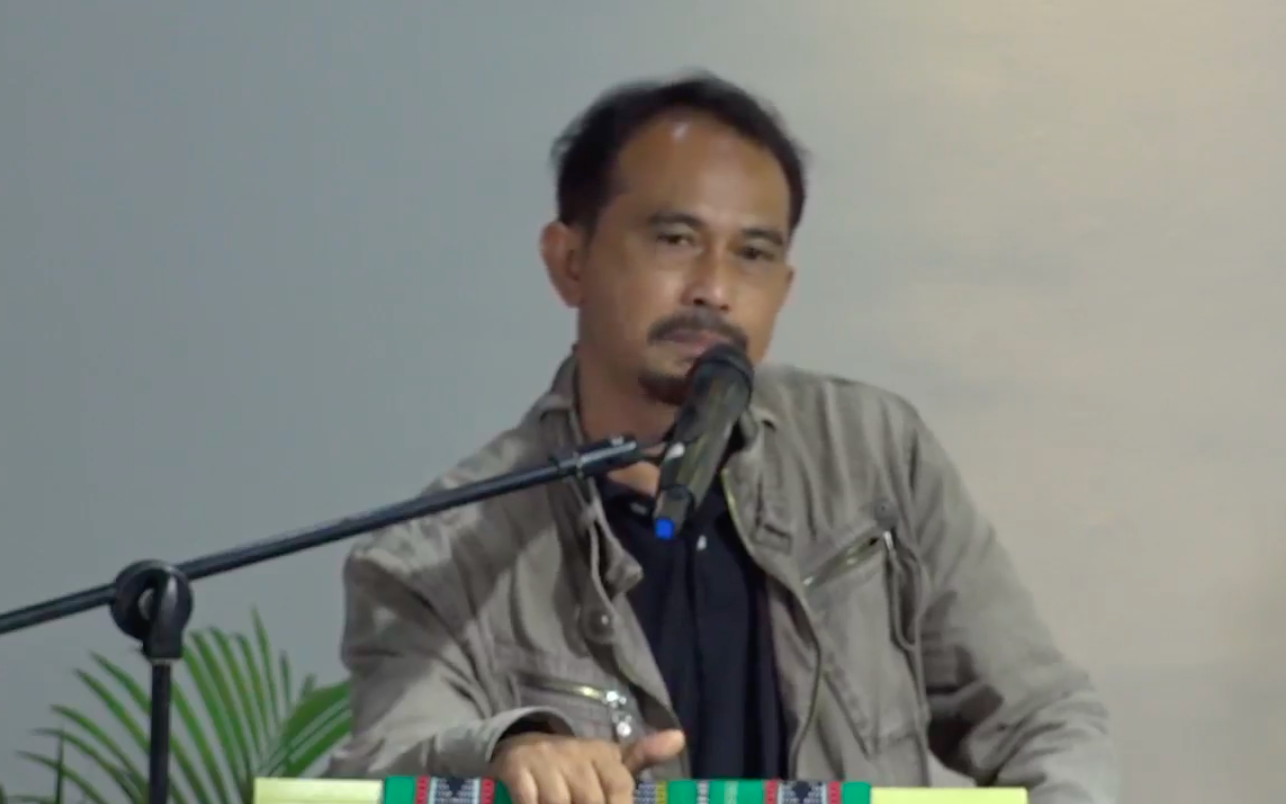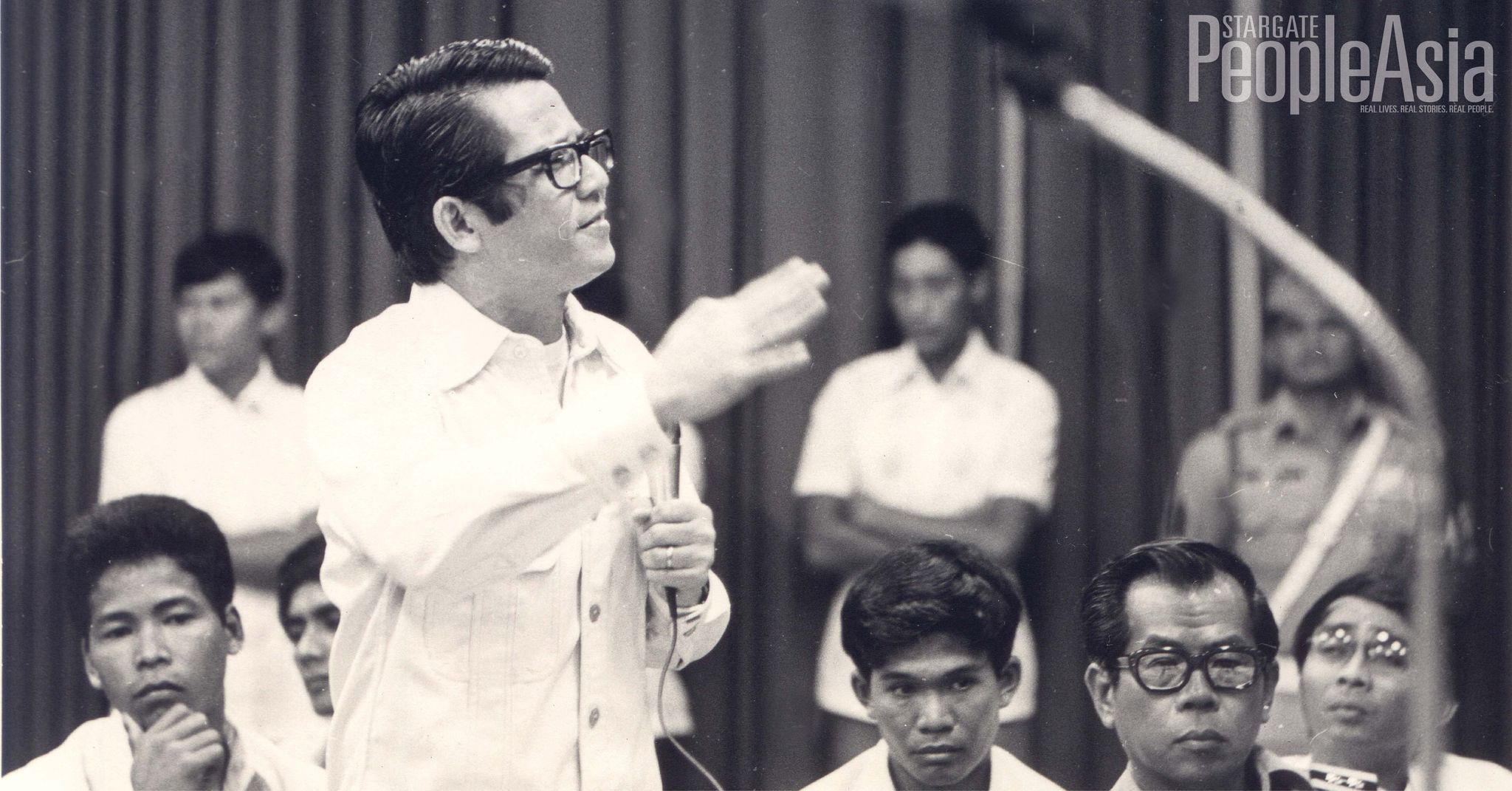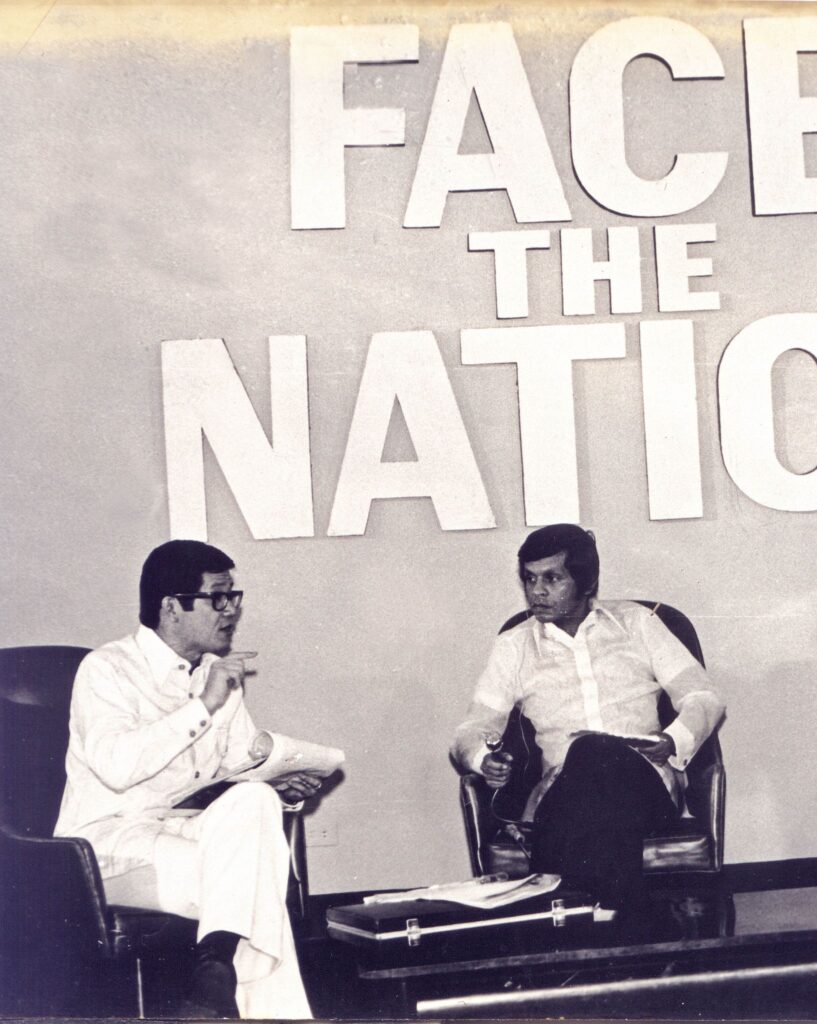Four decades after Benigno “Ninoy” Aquino was assassinated, we look back on the huge impact he has made on Philippine history. By remaining steadfast in his beliefs even if it meant incurring the ire of then President Ferdinand Marcos Sr. for being one of his staunchest critics, Ninoy’s bravery served as a catalyst that pushed Filipinos to fight to regain their freedom and the restoration of democracy. Then as now, his story remains as fresh and as relevant in the lives of Filipinos and people the world over yearning for freedom as well as a genuine and empowering form of democracy.
By Ma. Angelica Demegillo
Photos from PeopleAsia Ninoy: Ideals and Ideologies 1932-1983
The late Benigno “Ninoy” S. Aquino, Jr., a prominent figure in Philippine history whose name and story are now confined in history books, has left an indelible mark that continues to resonate with Filipinos and people around the world to this day.
But who is he, really? And why do we honor his memory every year on Aug. 21?
As a politician, journalist and staunch advocate of democracy, he remained true to his principles and never wavered in his pursuit of truth and justice for the betterment of his nation.
Ninoy captured the hearts and minds of his people for his role as a staunch critic of then President Ferdinand Marcos Sr’s. authoritarian regime. He led in fearlessly voicing out his resistance to the oppressive government. Charged with rebellion, he was later imprisoned in 1972. Ninoy endured almost eight years of unlawful incarceration, spending several years in solitary confinement before he was allowed by Marcos to seek medical treatment in the United States in 1980 for his heart condition.
In 1983, Ninoy returned to the Philippines from his self-imposed exile, despite being fully aware of the dangers he would soon face. Upon his arrival at the then Manila International Airport on Aug. 21, he was assassinated before he could even set foot on the tarmac. It was an event that shocked the nation and eventually sparked a wave of protests against the Marcos regime. It was also a pivotal moment that galvanized the opposition movement.


Marcos’ rapidly sinking popularity sank even further. The angered cries of people led him, upon the instigation of the US, to declare snap elections in December 1985.
Marcos found himself pitted against an unlikely political adversary in the person of Corazon C. Aquino, Ninoy’s widow. But even before the last ballot was counted, the opposition accused the incumbent administration of massive cheating, which was later supported by countless local and foreign observers. To the majority of Filipinos longing for freedom after 14 years of living under a dictatorship, it was the proverbial straw that broke the camel’s back, igniting what we have all come to know as the four-day EDSA People Power Revolution. By February 25, 1986, Marcos, after ruling the country for nearly 21 years, and his family were ousted from power and sent into exile in Hawaii.
Ninoy’s sacrifice, as demonstrated by his willingness to offer his life for the sake of freedom and democracy, turned him into a martyr and a symbol of courage and hope.
Today, we look back at how his legacy has helped shape Philippine society and change the trajectory of Filipinos’ journey in reclaiming democracy that we all continue to relish at present.
Ninoy Aquino today
Many Filipinos, especially those too young to remember or weren’t even born yet during those heady days, would often associate Ninoy, together with his wife Cory, as the bespectacled man in a crisp P500-bill, or the statue, other than Rizal’s, that they would often see at the town plaza in their town or city.
“For many Filipinos, if you ask them who Ninoy Aquino was, they will say that he’s the person whom the NAIA (Ninoy Aquino International Airport) is named after without really knowing the reason behind it or what really happened in our history,” former senator Bam Aquino, Ninoy’s nephew, said during a recent forum titled “TAPATan: Remembering Ninoy: His Legacy’s Relevance Today.”
Organized by the democratic alliance 1Sambayan, in partnership with the Ninoy and Cory Aquino Foundation, the forum sought to refresh Filipinos’ memories about Ninoy’s legacy – his heroism and fearless ways in criticizing the late dictator and how his principles remain relevant even to this day.
During the time of his long and unwarranted incarceration, Ninoy had learned the real meaning of true courage and love for country, even rediscovering God’s presence in his life. He could have simply lived the rest of his life as an exile in the US, but he chose to return to the Philippines, never compromising his beliefs in exchange for his freedom.
“Now that we’re remembering Tito Ninoy, I saw how courage can be contagious. Kapag may tumatayo, may mga tumatayo. Kapag may naninindigan, may mga tumitindig. (When someone stands, there will be people who’ll stand alongside him. When there’s someone who stays firm in his beliefs, there will be people who will stand firm with their beliefs alongside him). That’s the story of Ninoy Aquino and that’s part of history,” said Bam, adding that his Tito Ninoy’s transformative bravery affected him and his contemporaries, as well.
“Ang kwento ni Ninoy Aquino ay kwento ng isang Pilipino (Ninoy Aquino’s story is every Filipino’s story),” the former senator added. “Sana kwento rin ’yan ng Pilipinas na kung saan, sa dinami-rami ng ating pinagdaanan na dusa, ay mahahanap natin yung katapangan na siyang magdudulot ng pagbabago na hinahanap pa rin natin hanggang ngayon (Hopefully, it also becomes the story of the Philippines where we, despite the many adversities, will be able to muster the bravery that will lead to the change that we are still searching for).”

Other speakers at the forum also shared their testimonies and stories about the late senator whom they continue to look up to, 40 years after his assassination.
Former ACT Partylist president Luke Espiritu, for instance, shared how he views the late senator in three ways: the Ninoy whom he idolizes; the Ninoy whom he disagrees with; and the Ninoy whom he totally agrees with.
“Ninoy, the person whom I idolize, who became a martyr and gave his life to the nation, Ninoy whom I disagree and agree with, [remain] relevant today… He is someone who will stand with his principles and who will lay down his life for the principles that he fights for. That’s the Ninoy that we know and that kind of a person is very rare,” Espiritu shared.
“Talagang kailangan nating buhayin ang mga taong tulad ni Ninoy Aquino (We really need to keep the memory of people like Ninoy alive). I will march with him in the fight for our society to become democratic, humane, intelligent and logical,” the lawyer added.

Meanwhile, former House of Representatives member for the ACT Teachers Partylist Antonio Tinio echoes the same sentiments. For him, Ninoy’s most significant legacies that remain relevant nearly half a century on are his unwavering commitment to democracy, his resistance to authoritarianism and dictatorship, and his strong conviction that our nation can only achieve true unity and growth if social justice will be addressed.
“The relevance of his legacy of upholding democratic values, defending human rights and resisting authoritarian rule is particularly pronounced in today’s political climate, where the erosion of democratic institutions and the growth in violations of our people’s human rights and civil liberties under the previous regime,” said Tinio.
Ninoy, as a person
Aside from being a symbol of heroism and martyrdom, Ninoy was also a person. Kiko Aquino Dee, the fifth grandchild of Ninoy and Cory and the deputy executive director of Ninoy and Cory Foundation, shared how his Lolo Ninoy, whom he only know of from stories told to him by their relatives, was someone who loved his family dearly. He even shared how the late politician would buy cat food because it was on sale even if they own dogs. It was also the same Ninoy who accompanied his daughter, a young Kris Aquino, line up during the premier of Return of the Jedi while he and his family were on exile in the US. It’s the same lolo who fought for his nation’s freedom from the shackles of an oppressive government.
“Isa siyang taong nagmahal at nagdusa, pero sa dulo ng lahat, siya’y nagtagumpay. Kung nagdurusa kayo ngayon dahil sa pagmamahal niyo sa bayan, hindi kayo nag-iisa. Ito rin ang pinagdaanan ni Lolo Ninoy at ang pinagdadaanan ng marami ngayon (He was a person who loved and suffered, but at the end of it all, he was victorious. If you are suffering now because of your love for country, you’re not alone. This is also what my grandfather Ninoy went through and what others are still going through),” said Kiko.

Keeping his legacy alive
Ninoy’s legacy also serves as a reminder of the value of speaking truth to power, standing up for justice and defending the rights of the oppressed.
Every Aug. 21, we are reminded to look back at the past and the events that changed the trajectory of our nation’s future. The sacrifices that key people in Philippine history, such as Ninoy, has earned for us, especially the ideals of democracy that we continue to relish today. Similarly, we are also called upon to exhibit the same courage and bravery in the face of oppression that he showed during his time.
“We are never too young to remember and know the legacy and the importance of Ninoy today. We are never too old also to remember Ninoy, his legacy and the things that we fought for,” said 1Sambayan convenor Howard Calleja.
Ninoy’s sacrifice is a timeless story worth remembering, learning from and sharing with people, especially those who weren’t born yet in the ’80s, ’90s and beyond.“Ipakilala natin siya sana bilang isang Pilipino na nagmahal sa ating bayan, nagbago, naging matapang at naging daan sa katapangan ng marami pang iba (Let us introduce him as a Filipino who loved our nation, changed, became brave and set an example for many others),” Bam concluded.







